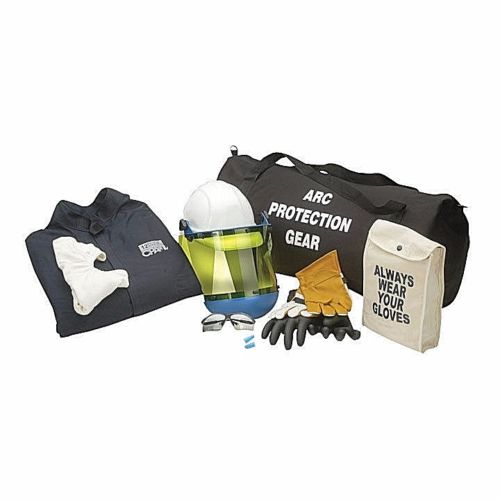
Chicago Protective Apparel Mechanix Wear AG8-CL 8cal Coat and Legging Kit with Gloves | No Tax!
Original price
€535,95
-
Original price
€694,95
Original price
€535,95
€535,95
-
€694,95
Current price
€535,95
Chicago Protective Apparel Mechanix Wear AG8-CL 8cal Coat and Legging Kit w/Gloves | Our CPA “Special Offer Discount”, No Sales Tax/Free Shipping is a real money saver! Buy Now. Limited time offer.
Arrives to you in a sealed CPA carton directly from CPA factory to your door. Authorized worldwide CPA distributor
Our 8 CAL Coat and Legging Kit includes the following items:
Coat: SWC-8 Leggings: SW-401-8 Hard Cap: HC-Color-SLT Face Shield with Chin Cup: WV-ARC-12 Cap Bracket: HB-2-CAP Knit Nomex® Hood: KN-51 11" Class 0 Rubber Gloves: LRIG-0-11 10" Leather Protector Gloves: PG-0-ADJS
- 12" Glove Bag: GB-12
- Gear Bag: 909-ARC
- Safety Glasses: SW-SG
- Ear Plugs: SW-EAR
Testing and Inspection. Gloves and sleeves must be electrically tested before being issued for use. They must also be visually inspected and gloves need to be air tested for any possible defects (for example, cuts, holes, tears, embedded objects, changes in texture) before each day's use and whenever there is a reason to believe they may have been damaged. Best practice is to inspect PPE and air test the gloves and sleeves before each use. [See 1910.137(b)(2)].
- Insulating equipment may not be used if any of the following defects are present: holes, tears, punctures or cuts, ozone cutting or ozone checking, embedded foreign objects, texture changes, including swelling, softening, hardening, or becoming sticky or inelastic, and any other defect that damages the insulating properties. [See 1910.137(b)(2)(iii) and ASTM F1236-96, Standard Guide for Visual Inspection of Electrical Protective Rubber Products].
- Insulating equipment failing to pass inspection must be removed from service and may not be used by workers.
-
Protector Gloves and Storage. To ensure worker safety and the integrity of the gloves and sleeves, insulating gloves need to be worn along with protector gloves (such as leather), and both insulating gloves and sleeves need to be stored properly when not in use. Proper storage means that gloves must not be folded and need to be kept out of excessive heat, sunlight, humidity, ozone, and any chemical or substance that could damage the rubber. [See 1910.137(b)(2)].
For additional information on the use of insulating gloves and sleeves, see ASTM F496, Standard Specification for In-Service Care of Insulating Gloves and Sleeves, and ASTM F1236-96, Standard Guide for Visual Inspection of Electrical Protective Rubber Products. Additionally, see 1910.137(b)(2).
The proposed rule recognizes Class 0 and 00 gloves. See the proposed rule for additional information.
Note: These are usually in stock at CPA factory warehouse. On occasion, a particular size may not be in stock and will have a short lead-time. If there is any lead-time for your order, we will immediately inform you.
8 CAL Coat & Legging Kit
AG8-CL-SIZE-GLOVE SIZE
IMPORTANT NOTE: BEWARE OF DISTRIBUTORS AND SELLERS OF CPA PRODUCTS THAT MIX AND MATCH OR DELIVER LESS THAN THE WHOLE KIT THAT COMES FROM CPA, SELLERS THAT DO NOT REQUEST GLOVE SIZE OPTION, DON'T GIVE SHIPPING ESTIMATES, ETC. Everything we sell of Chicago Protective Apparel comes 100% COMPLETE directly from CPA so you get all products included.
IMPORTANT: Our kits containing rubber protective voltage gloves, and glove kits, are shipped directly to you from CPA. This is important because some vendors stock voltage protecting rubber gloves and kits with same, and the rubber gloves when stored improperly (near excessive heat, folded, etc), or for long periods of time before sale, can become ineffective and dangerous to use, thus require proper testing before being put into use. See below from OSHA about testing

